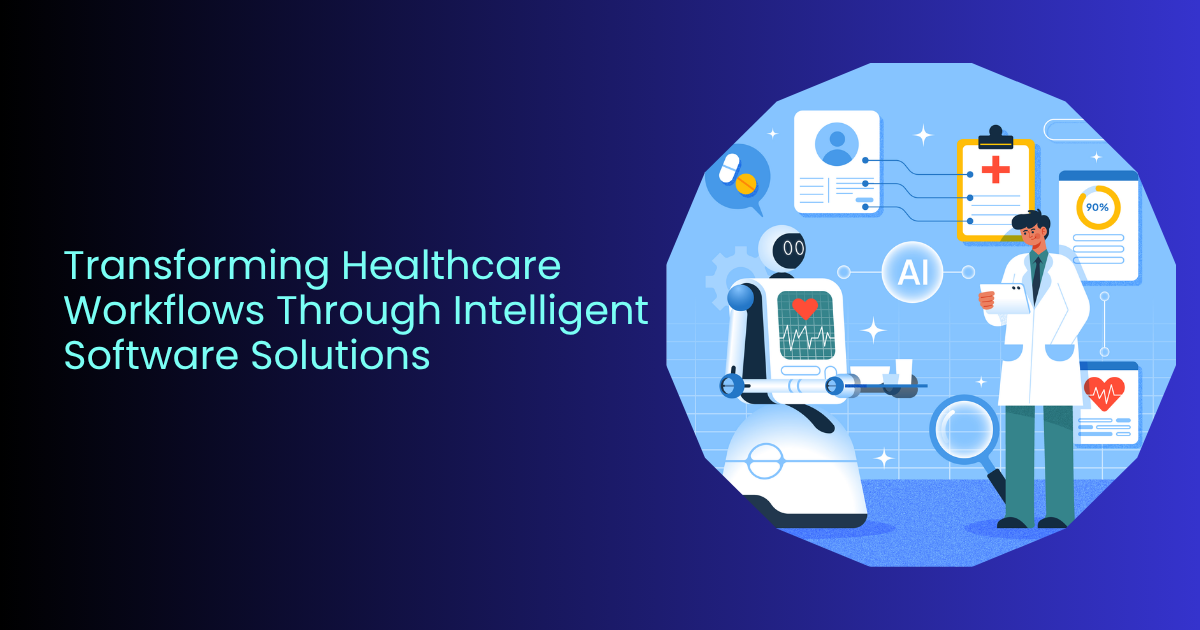Transforming Healthcare Workflows Through Intelligent Software Solutions
Recent research shows that global healthcare IT spending is expected to surpass $820 billion by 2030, reflecting a major shift toward digital transformation in the industry. Healthcare systems around the world are under increasing pressure to provide efficient, accurate, and patient-focused care. With rising patient volumes, complex regulations, and growing demand for faster outcomes, traditional healthcare workflows are falling short. Intelligent software solutions are stepping in to streamline operations and transform the way care is delivered.
In this comprehensive guide, we’ll explore how intelligent software solutions are transforming healthcare workflows, the key technologies involved, and the far-reaching benefits for providers, patients, and healthcare administrators alike.
1. What Are Intelligent Software Solutions?
Intelligent software solutions refer to advanced digital tools that leverage technologies like artificial intelligence (AI), machine learning (ML), natural language processing (NLP), data analytics, and automation to perform tasks traditionally requiring human intelligence. In healthcare, these solutions can analyze vast datasets, assist with clinical decision-making, automate routine tasks, and enhance communication between patients and providers.
2. The Current Challenges in Healthcare Workflows
Healthcare systems are notoriously complex. Even in modern hospitals, many processes are still manual, paper-based, or siloed across different departments. Common challenges include:
- Administrative overload
- Inefficient data management
- Communication breakdowns
- Long patient wait times
- Billing and insurance complexities
- Human error in diagnostics and documentation
These bottlenecks result in burnout for healthcare professionals, delayed patient care, and increased operational costs.
3. Key Technologies Driving Transformation
The transformation of healthcare workflows wouldn’t be possible without cutting-edge technologies. Let’s look at the core components:
a. Artificial Intelligence (AI)
AI helps in clinical diagnostics, predictive analytics, and personalized medicine by mimicking human intelligence to process complex datasets in seconds.
b. Robotic Process Automation (RPA)
RPA automates repetitive tasks like patient onboarding, claims processing, and appointment scheduling.
c. Natural Language Processing (NLP)
NLP enables software to understand and interpret human language, crucial for extracting information from clinical notes, reports, and patient queries.
d. Cloud Computing
Enables scalable data storage and access to software across different locations and devices.
e. Internet of Medical Things (IoMT)
Connects devices like wearables and remote monitoring tools to central systems, giving real-time health data to clinicians.
4. Enhancing Patient Data Management
Efficient patient data management is central to effective care delivery. Intelligent software aggregates data from Electronic Health Records (EHRs), labs, imaging systems, and even wearable devices into a unified dashboard. This makes patient histories accessible and actionable, leading to faster and more accurate diagnoses.
AI-driven analytics can also highlight trends and identify at-risk patients before problems escalate.
5. Automating Administrative Tasks
Administrative duties account for a significant chunk of healthcare costs. From insurance verification to coding and billing, intelligent software can:
- Reduce paperwork
- Minimize human error
- Speed up claim approvals
- Improve regulatory compliance
For example, RPA bots can scan documents, extract relevant data, and auto-fill forms all in a fraction of the time it takes a human.
6. Optimizing Clinical Decision Support
Decision support systems powered by AI assist doctors by providing evidence-based treatment options, alerting for potential drug interactions, and suggesting tests based on symptoms and patient history.
This results in better patient outcomes, fewer unnecessary procedures, and reduced diagnostic errors.
7. Improving Communication and Collaboration
Modern healthcare requires seamless communication across different departments and care teams. Intelligent collaboration tools enable:
- Secure messaging between providers
- Video consultations
- Real-time updates to shared patient files
- AI-powered chatbots for patient queries and appointment scheduling
This level of connectivity improves both internal efficiency and patient satisfaction.
8. Streamlining Workflow in Emergency Care
Time is critical in emergency medicine. Intelligent systems can triage patients based on severity using real-time data, prioritize tasks, and notify necessary departments automatically.
Automated alerts, smart dashboards, and predictive modeling ensure that resources are allocated where they’re needed most fast.
9. Enhancing Patient Engagement
Empowered patients are more likely to comply with treatment plans. Software solutions enhance patient engagement by offering:
- Mobile apps for health tracking
- AI health assistants
- Personalized health reminders
- Telehealth options
These tools allow patients to take charge of their health while providing clinicians with continuous data for monitoring.
10. Ensuring Data Security and Compliance
With the digitization of health data, security is paramount. Intelligent systems are designed with robust encryption, role-based access controls, and compliance with HIPAA and GDPR.
Additionally, AI tools can monitor for unusual activity and alert security teams to potential breaches in real time.
11. Real-World Examples of Intelligent Software in Action
a. IBM Watson Health uses AI to assist oncologists with treatment decisions by analyzing massive datasets of clinical research.
b. Cerner and Epic Systems offer cloud-based EHR platforms integrated with AI for personalized care.
c. Babylon Health leverages AI chatbots to deliver remote consultations and symptom assessments.
d. Zebra Medical Vision uses AI to read imaging scans, reducing the load on radiologists.
These examples demonstrate the real impact of intelligent software solutions on healthcare efficiency and effectiveness.
12. The Role of Healthcare Mobile App Development Companies
As mobile solutions become essential to modern healthcare delivery, the need for specialized development services has surged. Whether it’s building telemedicine platforms, patient portals, or remote monitoring tools, choosing the right healthcare mobile app development company is crucial. These experts understand both technical and regulatory aspects, ensuring that apps are secure, user-friendly, and compliant with healthcare standards.
Conclusion
The integration of intelligent software solutions in healthcare workflows is no longer a futuristic concept; it’s happening now, reshaping how care is delivered, managed, and experienced. These technologies reduce administrative burden, enhance clinical accuracy, and place the patient at the center of every interaction.
As adoption continues to grow, healthcare organizations that embrace these tools will be better equipped to deliver timely, efficient, and high-quality care, ensuring healthier outcomes and sustainable operations in the years to come.

